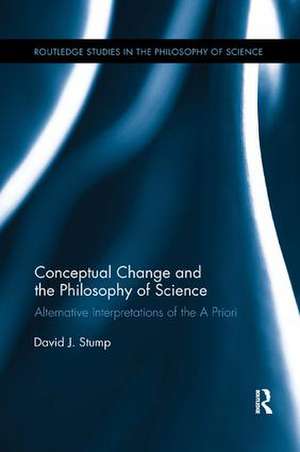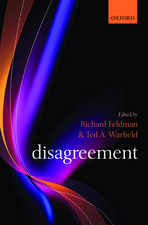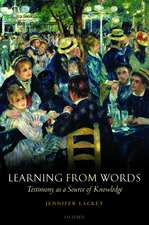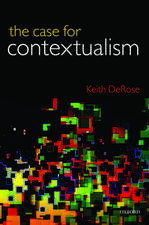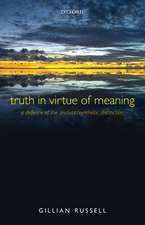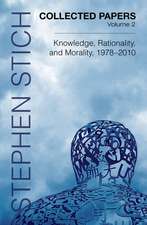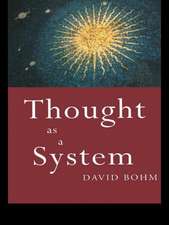Conceptual Change and the Philosophy of Science: Alternative Interpretations of the A Priori: Routledge Studies in the Philosophy of Science
Autor David J. Stumpen Limba Engleză Paperback – 14 aug 2018
| Toate formatele și edițiile | Preț | Express |
|---|---|---|
| Paperback (1) | 409.10 lei 43-57 zile | |
| Taylor & Francis – 14 aug 2018 | 409.10 lei 43-57 zile | |
| Hardback (1) | 1107.61 lei 43-57 zile | |
| Taylor & Francis – 20 mai 2015 | 1107.61 lei 43-57 zile |
Din seria Routledge Studies in the Philosophy of Science
-
 Preț: 370.09 lei
Preț: 370.09 lei -
 Preț: 312.20 lei
Preț: 312.20 lei -
 Preț: 311.39 lei
Preț: 311.39 lei -
 Preț: 314.92 lei
Preț: 314.92 lei -
 Preț: 490.25 lei
Preț: 490.25 lei -
 Preț: 384.31 lei
Preț: 384.31 lei - 18%
 Preț: 897.52 lei
Preț: 897.52 lei - 18%
 Preț: 1118.82 lei
Preț: 1118.82 lei - 18%
 Preț: 999.64 lei
Preț: 999.64 lei - 18%
 Preț: 1001.70 lei
Preț: 1001.70 lei -
 Preț: 482.53 lei
Preț: 482.53 lei -
 Preț: 485.61 lei
Preț: 485.61 lei -
 Preț: 431.35 lei
Preț: 431.35 lei - 8%
 Preț: 398.45 lei
Preț: 398.45 lei -
 Preț: 356.64 lei
Preț: 356.64 lei -
 Preț: 380.07 lei
Preț: 380.07 lei -
 Preț: 389.66 lei
Preț: 389.66 lei -
 Preț: 341.75 lei
Preț: 341.75 lei - 14%
 Preț: 313.82 lei
Preț: 313.82 lei -
 Preț: 479.29 lei
Preț: 479.29 lei - 18%
 Preț: 1000.30 lei
Preț: 1000.30 lei -
 Preț: 383.89 lei
Preț: 383.89 lei -
 Preț: 384.86 lei
Preț: 384.86 lei -
 Preț: 428.74 lei
Preț: 428.74 lei -
 Preț: 482.56 lei
Preț: 482.56 lei -
 Preț: 395.47 lei
Preț: 395.47 lei -
 Preț: 433.26 lei
Preț: 433.26 lei - 20%
 Preț: 938.05 lei
Preț: 938.05 lei - 18%
 Preț: 1007.23 lei
Preț: 1007.23 lei -
 Preț: 443.65 lei
Preț: 443.65 lei
Preț: 409.10 lei
Nou
Puncte Express: 614
Preț estimativ în valută:
78.31€ • 85.09$ • 65.82£
78.31€ • 85.09$ • 65.82£
Carte tipărită la comandă
Livrare economică 21 aprilie-05 mai
Preluare comenzi: 021 569.72.76
Specificații
ISBN-13: 9781138346697
ISBN-10: 1138346691
Pagini: 194
Ilustrații: 6 Illustrations, black and white
Dimensiuni: 152 x 229 x 11 mm
Greutate: 0.29 kg
Ediția:1
Editura: Taylor & Francis
Colecția Routledge
Seria Routledge Studies in the Philosophy of Science
Locul publicării:Oxford, United Kingdom
ISBN-10: 1138346691
Pagini: 194
Ilustrații: 6 Illustrations, black and white
Dimensiuni: 152 x 229 x 11 mm
Greutate: 0.29 kg
Ediția:1
Editura: Taylor & Francis
Colecția Routledge
Seria Routledge Studies in the Philosophy of Science
Locul publicării:Oxford, United Kingdom
Public țintă
Postgraduate and UndergraduateCuprins
1. Introduction: Theories of the Constitutive Elements in Science 2. Reinventing Geometry as a Formal Science 3. Poincaré’s Conventionalisms 4. The Logical Empiricist or Positivist Engagement with A Priori Knowledge: Schlick, Reichenbach, Carnap, and Ayer 5. Alternative Conceptions of the A Priori: Cassirer, Lewis, and Pap 6. The Status of Newton’s Laws 7. Conceptual Change and the Constitutive Elements of Science: Kuhn, Friedman and Hacking 8. On the Role of Mathematics in Physical Theory 9. Epilogue: A Pragmatic Theory of the Constitutive Elements in Science
Notă biografică
David J. Stump is a philosopher of science at the University of San Francisco, USA. He is co-editor, with Peter Galison, of The Disunity of Science, and is author of numerous journal articles on the history and philosophy of science.
Descriere
In this book, David Stump traces alternative conceptions of the a priori in the philosophy of science and defends a unique position in the current debates over conceptual change and the constitutive elements in science. Stump emphasizes the unique epistemological status of the constitutive elements of scientific theories, constitutive elements being the necessary preconditions that must be assumed in order to conduct a particular scientific inquiry. These constitutive elements, such as logic, mathematics, and even some fundamental laws of nature, were once taken to be a priori knowledge but can change, thus leading to a dynamic or relative a priori. Stump critically examines developments in thinking about constitutive elements in science as a priori knowledge, from Kant’s fixed and absolute a priori to Quine’s holistic empiricism. By examining the relationship between conceptual change and the epistemological status of constitutive elements in science, Stump puts forward an argument that scientific revolutions can be explained and relativism can be avoided without resorting to universals or absolutes.
